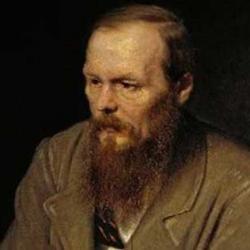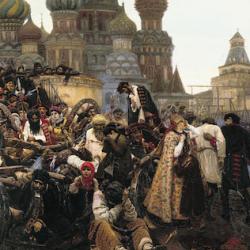So, this is a moment of dialog with myself. I have been musing on Bakhtin and Dostoevsky, so the self-division seems appropriate.
I have charged that Dostoevsky’s Christ is an ineffectual liberal Christ, using The Idiot as exhibit #1. But Diane Thompson’s essay on the biblical word in Dostoevsky’s poetics (Dostoevsky and the Christian Tradition) brings me up short.
Thompson emphasizes the absences in The Idiot: “Here, as opposed to Dostoevsky’s other
novels, there are no readings or faithful interpreters of the biblical
word, no prayers, no heavenly visions, no biblical epigraphs, no
references to the Kingdom, and no one moves towards redemption
or renewal through the Word” (75). She cites Jostein Bortnes’s theory that Dostoevsky associated Myshkin with Don Quixote, the holy fool, and Christian, and then proceeds to rip the rug from beneath each in a “process of de-symbolization” that leaves the Prince without salvific poetency.
Thompson argues, “There are initially just enough
similarities in Myshkin’s image to establish a connection with Christ.
However, his Christological attributes are progressively offset and
undermined by qualities which render him impotent and are
therefore inimical to them. His compassion degnerates into pity, his
humility into weakness, his penetrant word disintegrates into incoherence
and his attempts to reconcile those he loves provoke only
hurt and rivalrous hatred. His word changes nothing, and even
causes unwitting harm. . . . Myshkin
resolves into a tragic parody of Christ, a failed kenosis without the
backbone of the Word” (76). He is finally “as impotent in the living death of his incurable idiocy as the
Christ of Holbein’s painting.”
Similarly, she recognizes that Ivan Karamazov’s silent Christ “has no power to transform one’s life on earth, no
further revelations to offer” (92). But this is clearly not the final vision of Christ in Brothers K: “Alyosha’s encounter with the biblical word is transformational.
While praying by Zosima’s cof®n, Alyosha hears Father Paisy
reading the miracle at Cana of Galilee in liturgical Church Slavonic.
`I love that passage’, he says . . . . As the sonorous ancient words,
ever new, speak to his young soul, all the hatreds and dissonant
words rending the Karamazov world recede and give way to serene
joy, to a dream which culminates in the appearance of the resurrected
Zosima in heaven, pointing to the radiant vision of `our Sun.’ . . . For Alyosha, the Jesus Who celebrated the wedding at Cana
is the same as the Christ Who invites everyone to the banquet in
heaven. In his hero’s experience, Dostoevsky presents Jesus Christ in
the fullness of His Godhead, fully human and divine, conjoining
earth and heaven. After glimpsing the beatific vision, Alyosha takes
possession of his true voice and goes `into the world’” (93).
Which would mean, in the terms I set, that The Idiot and Brothers imply a critique of liberal Christology, an Orthodox affirmation of the divinity of the incarnate Son, resistance to humanist reductions from the West, and a rejection of “Western” conceptions of the relations of church and state. I sure would like Thompson to be right about all that.














